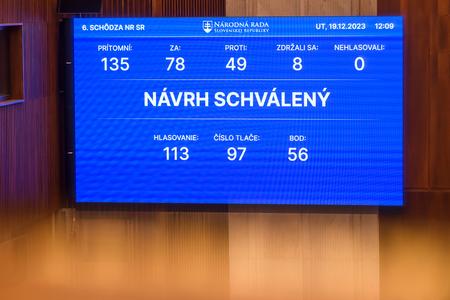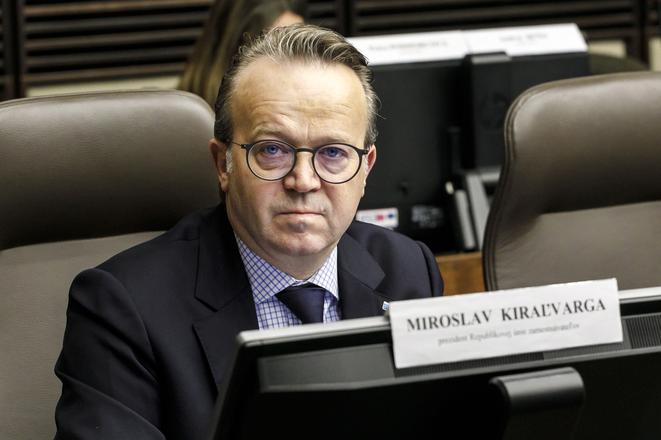In a country grappling with high deficits and mounting pressure to consolidate its finances, Slovakia’s leading employers have unveiled a detailed cost-cutting plan they claim could save the state €6.5 billion – without raising taxes.
“Raising taxes is the easy way out of poor fiscal management,” said Republic Union of Employers (RÚZ) president Miroslav Kiraľvarga.
The proposal, revealed on Wednesday by the Republic Union of Employers, was submitted to Finance Minister Ladislav Kamenický earlier this month but had not been made public until now, according to Denník N. It comes as Kamenický, a member of the ruling left-wing Smer party, seeks to cut next year’s budget deficit by €1.8 billion.
21 proposals
RÚZ’s 21-point plan calls for sweeping reforms in public administration, including a gradual 15 percent reduction in civil service employment. Over the past 15 years, the number of public sector workers has risen by 100,000, the union claims, now accounting for one in five jobs in the country. RÚZ argues that attrition through retirements – without replacements – could generate substantial savings, notably up to €2 billion in the long term.
Other proposed measures include a three-year freeze on public sector wages, the elimination of two national holidays as days off, and the scrapping of schemes such as vacation vouchers and housing loan subsidies. The group also proposes cancelling early retirement benefits – a move it says could save €400 million – arguing that existing unemployment and sickness support can serve as fallback mechanisms.
RÚZ further calls for the consolidation or abolition of redundant state agencies, including the Gambling Regulation Authority.
The organisation insists its proposals would not only stabilise public finances but also preserve Slovakia’s economic competitiveness.
Employers slammed by Fico
However, Prime Minister Robert Fico, who returned to power in 2023, swiftly rejected the proposals. Speaking during an inspection visit to the Finance Ministry last week, he accused employers of targeting vulnerable groups. “You want the government to take money from pensioners?” he asked rhetorically. “Strangely, you haven’t mentioned sacrifices from your own ranks.”
Fico, who has styled himself as a defender of the welfare state, cited employer-backed suggestions such as scrapping the 13th pension, ending free rail travel for students and pensioners, and cutting free school lunches. “That’s a €35–40 million cost, and we need billions,” he said, suggesting instead that Slovakia consider progressive taxation for higher earners.
RÚZ denies it proposed abolishing the 13th pension outright. “We support better targeting of benefits, but we’re not calling for its complete abolition,” Kiraľvarga clarified.

While his cabinet’s previous consolidation package focused on tax increases, Fico said last week that he is prepared to implement significant savings within the state apparatus, pointing to potential cuts in the number of civil servants, local governments, and even members of parliament. He also floated the idea of raising the threshold for parties to enter parliament. However, he expressed doubt that his proposals would gain support from his two coalition partners or the opposition.
21 consolidation proposals from employers
Streamlining public administration: estimated savings of €3.08 billion
Reducing employment and wage expenditure in public administration: €2 billion
Cutting expenditure on goods and services in public administration: €250 million
Halving severance pay in public administration: €20 million
Reducing public sector employment/merging local government functions: €200 million
Improving state property insurance efficiency (state self-insurance): €20 million
Abolishing redundant public institutions and offices: €150 million
Aligning budgeted energy expenditure with actual costs: €160 million
Preventing abuse of sickness benefits: €60 million
Accelerating the consolidation of small schools and abolishing compensation for multi-grade classes: €130 million
Halving public sector contributions to the third pension pillar: €40 million
Halving severance pay in the service pension system: €17 million
Selling off surplus state assets: €500 million
Increasing the proportion of civilian employees in the police force: €6 million
Reducing toll collection costs: €27 million
Targeted state support: estimated savings of €2.42 billion
Comprehensive reassessment of all benefit schemes and introduction of a single support system for households’ basic needs: €2 billion
Targeted energy subsidies: €400 million
Abolition of the contribution towards increased mortgage repayments: €20 million
Labour and employment: Estimated savings of €740 million
Abolition of two public holidays: €300 million
Scrapping of recreation vouchers, sports vouchers and other mandatory employee benefits: €40 million
Elimination of early retirement options: €400 million
Full implementation of government-approved spending review measures: up to €1 billion
Implementation of departmental spending review measures: Savings between €250 million and €1 billion
Source: RÚZ


 President of the Republic Union of Employers (RÚZ), Miroslav Kiraľvarga. (source: TASR - Dano Veselský)
President of the Republic Union of Employers (RÚZ), Miroslav Kiraľvarga. (source: TASR - Dano Veselský)